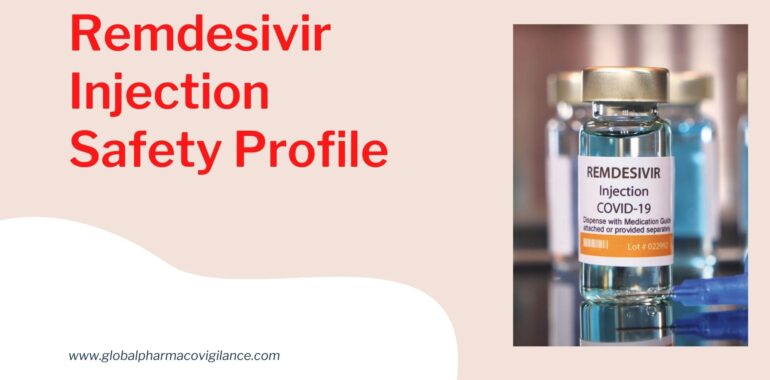Remdesivir Safety Profile

Remdesivir Safety Profile
Remdesivir Safety Profile
Remdesivir authorized in the EU as Veklury
Remdesivir is an antiviral medicine used to treat coronavirus disease 2019 (COVID-19). It is used in adults and adolescents (from 12 years of age and weighing at least 40 kilograms) with pneumonia requiring supplemental oxygen (low- or high-flow oxygen or other non-invasive ventilation at the start of treatment).
COVID-19, which is caused by SARS-CoV-2 virus, was declared a pandemic by the World Health Organization on 11 March 2020
Remdesivir is given via infusion (drip) into a vein. Treatment should start with a 200 mg infusion on the first day, followed by 100 mg once a day. The total duration of treatment should be at least 5 days and no more than 10 days.
The medicine can only be obtained with a prescription and its use is limited to healthcare facilities in which patients can be monitored closely.
Remdesivir, is a viral RNA polymerase inhibitor. It interferes with the production of viral RNA (genetic material), preventing the virus from multiplying inside cells. This can help the body to overcome the virus infection, and may help patients get better faster.
Remdesivir Safety Profile
Summary of Possible adverse reactions:
Like all drugs, Remdesivir can cause side effects, although not everybody gets them.
Very common side effects (these may affect more than 1 in 10 patients)
- Blood tests may show an increase in liver enzymes, called transaminases.
Common side effects (these may affect up to 1 in 10 patients)
- Headache
- Feeling sick (nausea)
- Rash
Rare side effects (these may affect up to 1 in 1000 patients)
Allergic reactions or reactions following the infusion. Symptoms can include:
- Changes to blood pressure or heart rate
- Low oxygen level in blood
- High temperature
- Shortness of breath, wheezing
- Swelling of the face, lips, tongue or throat (angioedema)
- Rash
- Feeling sick (nausea)
- Being sick (vomiting)
- Sweating
- Shivering
You will not usually be given Remdesivir:
- if you are allergic to remdesivir, or any of the other ingredients of this medicine (betadex sulfobutyl ether sodium, hydrochloric acid and sodium hydroxide)
- Talk to your doctor or nurse as soon as possible, if this applies to you.
Remdesivir Safety Profile
As per EU Risk Management Plan
| Important Identified Risks | · Hypersensitivity including
Infusion-Related Reaction |
| Important Potential Risks | · Hepatotoxicity
· Nephrotoxicity |
| Missing Information | · Safety in patients with hepatic impairment
· Safety in patients with severe renal Impairment · Safety in pregnant and lactating women |
Remdesivir Safety Profile
Measures to minimise the risks identified for medicinal products can be:
- Specific Information, such as warnings, precautions, and advice on correct use, in the package leaflet and SmPC addressed to patients and healthcare professionals;
- Important advice on the medicine’s packaging;
- The authorized pack size — the amount of medicine in a pack is chosen so to ensure that the medicine is used correctly;
- The medicine’s legal status — the way a medicine is supplied to the public (e.g. with or without prescription) can help to minimises its risks.
Other relevant Article:
FDA alerts potential risks associated with the compounding of Remdesivir drug products
One thought on “Remdesivir Safety Profile”